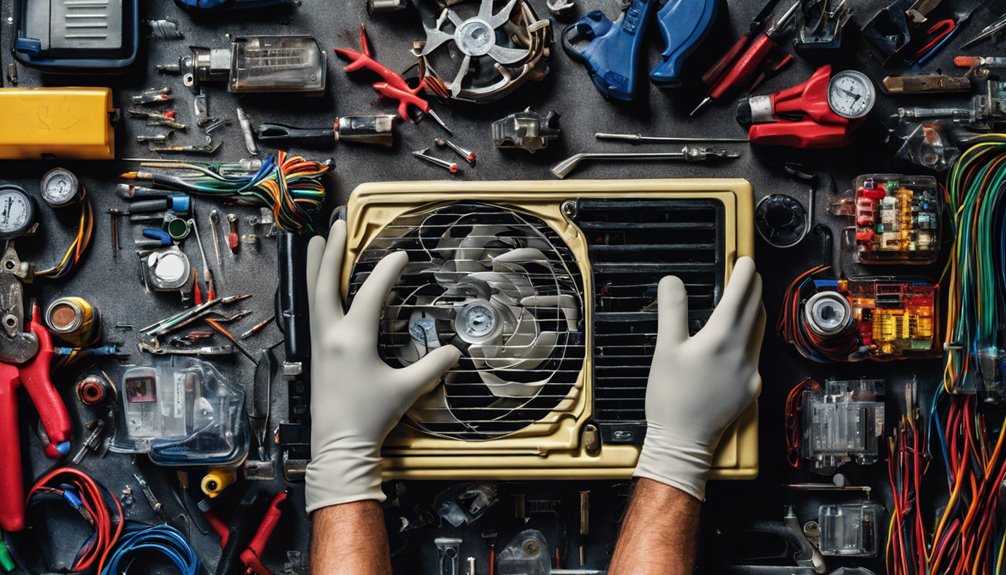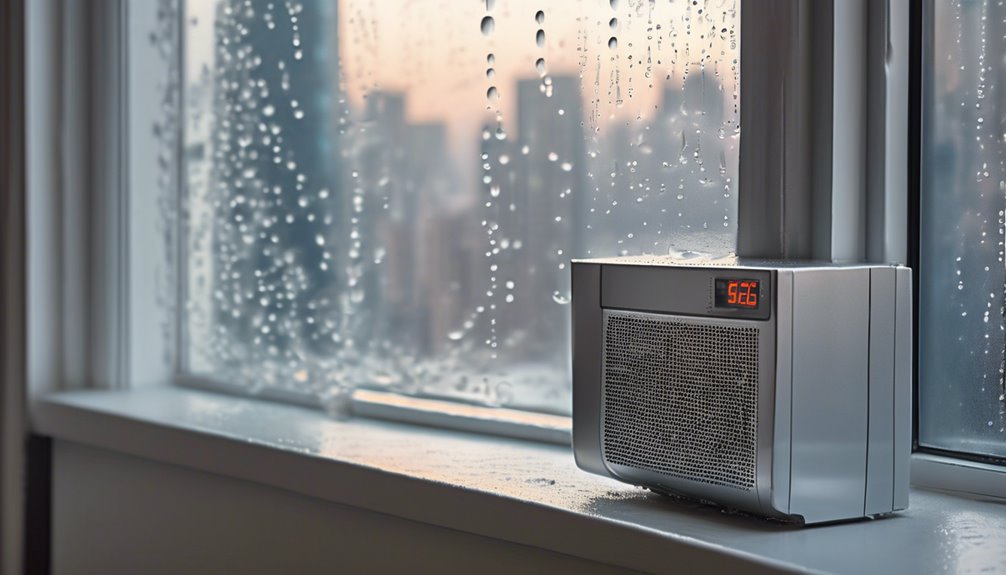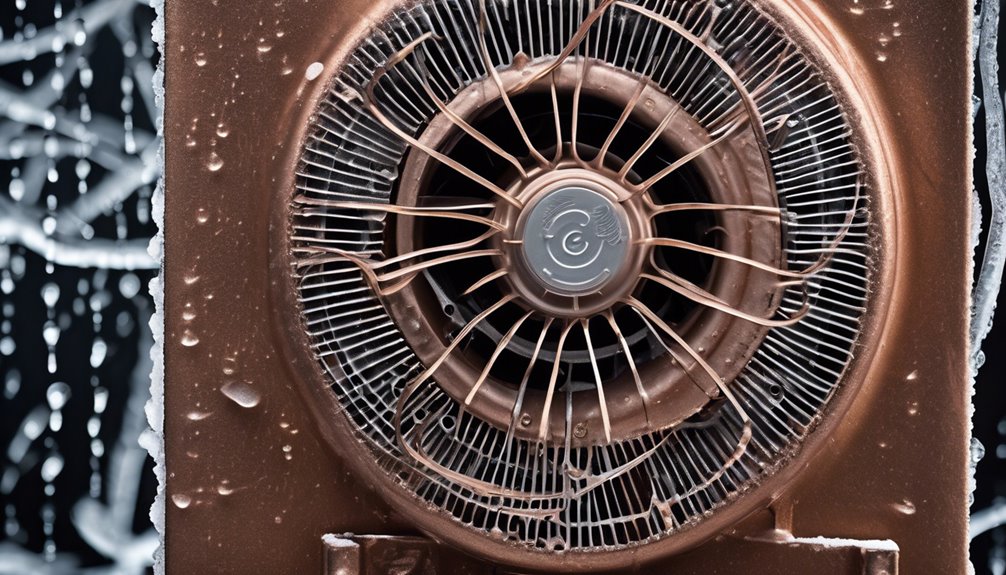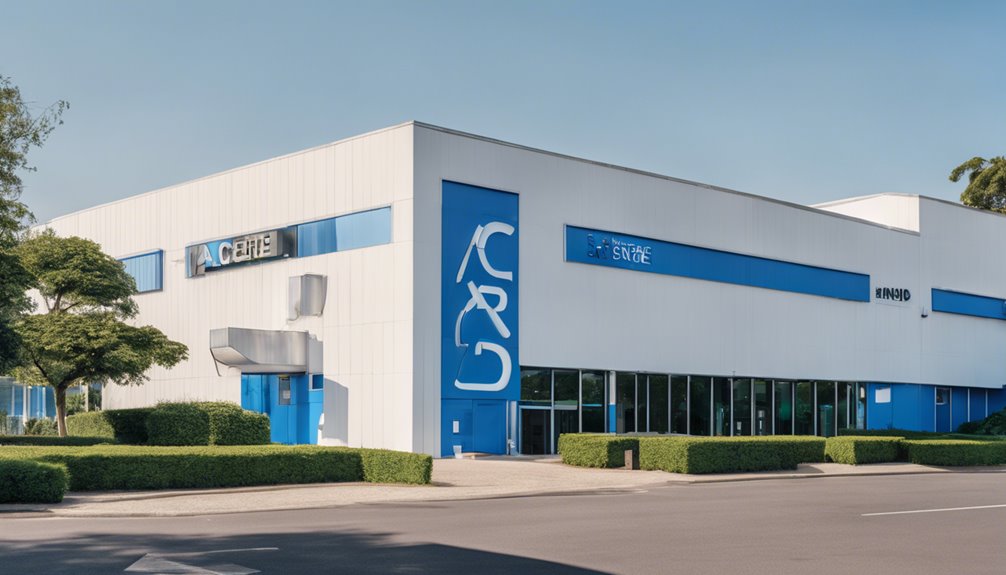When your AC unit breaks down, you're left sweating and stressed. Don't let air leaks, faulty sensors, and uneven cooling turn your home into a hotbox. Regular maintenance is key to avoiding costly repairs, energy-guzzling inefficiencies, and even DIY dangers. By keeping your system in top shape, you'll enjoy lower energy bills, improved air quality, and a longer-lasting AC. Keep exploring to discover the essential maintenance tasks, benefits of preventative care, and how to choose the right repair service to keep your home cool and comfortable all season long.
Key Takeaways
- Professional AC repair and maintenance ensure the job is done correctly and safely, avoiding further damage and costly repairs.
- Regular maintenance adds years to an AC system's lifespan by identifying and addressing potential issues before they become major problems.
- DIY troubleshooting can lead to costly mistakes and DIY dangers, whereas professional help provides accurate diagnoses and effective solutions.
- Essential maintenance tasks include establishing a filter cleaning schedule, thermostat calibration checks, and regular system inspections to prevent major problems.
- Energy-efficient AC systems with high EER and SEER ratings reduce energy consumption, leading to cost savings and a cooler home.
Identifying Common AC Problems
Several common AC problems can leave you sweating in the summer heat.
You mightn't even realize it, but air leaks around windows, doors, and ducts can cause your AC to work harder, increasing your energy bills and reducing its overall efficiency.
Another issue is faulty sensors, which can prevent your AC from accurately reading the temperature, leading to inconsistent cooling.
If you're noticing uneven cooling, warm spots, or higher-than-usual energy bills, it's likely one of these issues is to blame.
The Importance of Regular Maintenance
You're probably aware that your AC system is a significant investment, and you want to get the most out of it.
Regular maintenance is key to achieving this goal, as it helps extend your system's lifespan, reduces your energy bills, and prevents costly breakdowns.
Extend System Lifespan
One of the most significant advantages of regular AC maintenance is that it can add years to your system's lifespan.
By performing routine system checks, you can identify and address potential issues before they become major problems. This proactive approach helps prevent premature wear and tear, reducing the likelihood of breakdowns and prolonging the life of your air conditioner.
Additionally, regular maintenance ensures your system operates efficiently, which also improves air quality by reducing the amount of pollutants and allergens circulating in your home. By extending your system's lifespan, you'll avoid costly replacements and enjoy a comfortable, healthy indoor environment for years to come.
Reduce Energy Bills
Regular maintenance plays a crucial role in reducing your energy bills by ensuring your AC system operates at its optimal level.
A well-maintained AC system consumes less energy, which translates to lower energy bills. You can also consider conducting energy audits to identify areas of improvement in your home's energy efficiency.
This will help you pinpoint opportunities to optimize your AC system's performance and reduce energy consumption. Additionally, many utility companies offer cooling incentives for homeowners who take steps to reduce their energy consumption.
Prevent Breakdowns
Air conditioning systems, like any complex machine, are prone to breakdowns when neglected.
You can prevent this by ensuring your system is properly installed and maintained. A proper installation sets the stage for a long-lasting and efficient system.
Seasonal checks are also crucial to identify potential issues before they escalate into major problems. By scheduling regular maintenance, you'll avoid costly repairs and downtime.
Additionally, you'll enjoy improved air quality, increased energy efficiency, and a longer system lifespan. Don't wait until your AC breaks down – take proactive steps to prevent it.
Stay on top of maintenance, and your system will reward you with consistent performance and comfort.
DIY Troubleshooting Vs Professional Help
When your AC unit breaks down, you're left sweating and wondering whether to try fixing it yourself or calling in a professional.
While DIY troubleshooting may seem like a cost-effective solution, it can lead to costly mistakes and DIY dangers. Without proper training and experience, you may misdiagnose the issue, causing further damage to your unit.
This can result in more expensive repairs or even render your AC unit beyond repair. Additionally, DIY attempts can also void your warranty, leaving you with a hefty bill.
In most cases, it's better to err on the side of caution and call a professional to ensure the job is done correctly and safely.
Essential AC Maintenance Tasks
You can't skip essential AC maintenance tasks if you want your unit to run efficiently and effectively.
To get started, you'll need to establish a filter cleaning schedule to ensure good airflow and prevent damage to your AC's internal components.
Additionally, you should also perform a thermostat calibration check to ensure it's providing accurate temperature readings.
Filter Cleaning Schedule
Your AC's filter is a crucial component that requires regular cleaning to ensure the system runs efficiently and effectively.
A dirty filter can significantly decrease air quality and reduce filter durability. You should clean or replace your filter every 1-3 months, depending on usage and manufacturer's instructions.
Failing to do so can lead to increased energy bills, reduced airflow, and even system breakdowns. Create a cleaning schedule to stay on track. Set reminders or mark your calendar to ensure you don't forget.
Thermostat Calibration Check
The thermostat is the brain of your AC system, regulating temperature and ensuring a comfortable indoor climate.
You rely on it to keep your home cool, but what if it's not functioning correctly? A thermostat calibration check is essential to ensure your AC system is running efficiently.
If your thermostat is miscalibrated, you'll experience temperature fluctuations, leading to increased energy bills and reduced system lifespan.
During the check, a professional will verify that your thermostat is accurately reading the temperature and sending the correct signals to your AC unit.
This simple task can make a significant difference in your system's performance and your wallet.
Benefits of Preventative Maintenance
Many homeowners wait until their air conditioner breaks down to call a repair service, but this reactive approach can lead to costly repairs, increased energy bills, and even safety hazards.
By investing in preventative maintenance, you can avoid these issues and enjoy a range of benefits.
Regular tune-ups improve system performance, reducing the risk of breakdowns and ensuring your AC runs efficiently. This, in turn, helps maintain good air quality by removing pollutants and allergens from the air.
Additionally, preventative maintenance can help you save money on energy bills, as a well-maintained AC uses less power to cool your home.
How to Choose the Right AC Repair Service
When it comes to AC repairs, you're not limited to just any service – you need a reliable expert who can get the job done efficiently. You want a technician who can diagnose the issue quickly and provide effective solutions.
| Trait | Why It Matters |
|---|---|
| Experience | They've seen similar issues before and know how to fix them fast. |
| Summer Checks | They offer routine maintenance checks to prevent breakdowns during peak summer seasons. |
| AC Warranties | They understand the terms of your warranty and can help you avoid voiding it. |
Understanding AC Repair Costs
One of the most significant factors in choosing an AC repair service is understanding the costs involved.
You need to know what you're getting into and how much it'll set you back.
When getting repair quotes, it's essential to consider the following cost factors:
- Labor costs: The technician's hourly rate and the time spent on the repair will impact your overall bill.
- Parts and materials: The cost of replacement parts, such as capacitors or compressors, will add to your total expense.
- Additional services: Some repairs may require additional services, like cleaning or maintenance, which can increase the final cost.
Energy Efficiency and Your AC System
As you consider the cost of AC repairs, it's also important to think about the long-term savings you can achieve by optimizing your system's energy efficiency.
By upgrading to modern cooling technology, you can significantly reduce your energy consumption. This won't only help the environment, but it'll also lower your utility bills.
Look for systems with high Energy Efficiency Ratings (EER) and Seasonal Energy Efficiency Ratings (SEER) to ensure you're getting the most bang for your buck.
Additionally, regular maintenance can help your AC unit run more efficiently, which can also lead to cost savings. By prioritizing energy efficiency, you can enjoy a cooler home while keeping more money in your pocket.
Extending the Lifespan of Your AC Unit
Regular maintenance is key to extending the lifespan of your AC unit, and it starts with you.
By taking proactive steps, you can ensure your system runs efficiently and effectively for years to come.
- Schedule regular system inspections to identify and address potential issues before they become major problems.
- Change your air filters regularly to maintain good air quality and reduce strain on your system.
- Clean your condenser coils to ensure proper heat transfer and prevent overheating.
Frequently Asked Questions
Can I Install an AC Unit Myself to Save Money?
You might think installing an AC unit yourself will save you cash, but beware of DIY challenges and potential installation mistakes that can lead to safety hazards, inefficient performance, and even voiding the warranty.
How Often Should I Replace My Ac's Air Filters?
You should replace your air filters every 1-3 months, depending on filter quality and type, to ensure clean air and efficient performance. Check your filter type, as some last longer than others, and consider upgrading to a high-quality filter for better results.
Will a New AC Unit Increase My Home's Value?
When selling your home, you'll want to know if upgrades like a new AC unit will boost its value. A new, energy-efficient AC can increase your property's appraisal value, making it more attractive to potential buyers, which you'll appreciate when negotiating the sale price.
Can I Use a Programmable Thermostat With My AC?
You can definitely use a programmable thermostat with your AC, which allows you to adjust thermostat settings to optimize energy efficiency when you're away or sleeping, saving you money and reducing your carbon footprint.
Are There Any AC Units That Are Environmentally Friendly?
You're looking for an eco-friendly AC unit! You'll be happy to know that many brands, like Trane and Carrier, offer eco-friendly options with high energy efficiency ratings, reducing your carbon footprint and saving you money on utility bills.
Conclusion
You've taken the first step in ensuring your air conditioner runs smoothly and efficiently by learning about common problems, maintenance tasks, and repair solutions. By staying on top of maintenance and addressing issues promptly, you'll enjoy a cooler, more comfortable home while saving energy and extending the life of your AC unit. Remember, preventative maintenance is key, so don't wait until it's too late – stay proactive and breathe easy all summer long!



